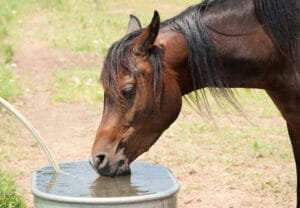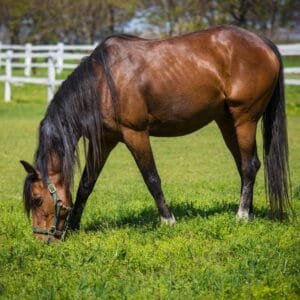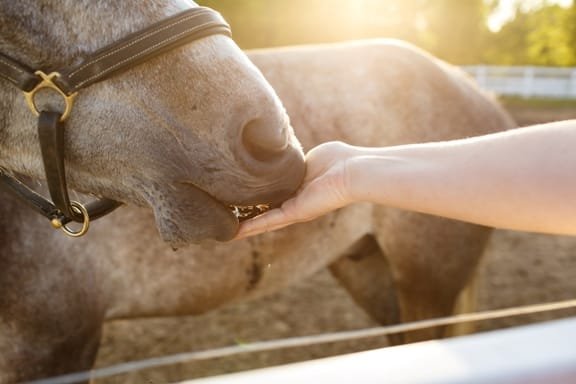Feeding your horse the right diet is essential for maintaining its overall health, energy levels, and performance.
Horses are herbivores with specific dietary needs that can vary depending on factors like age, activity level, and health conditions. Understanding the basics of equine nutrition can help you create a feeding plan that keeps your horse in top shape. Here’s a breakdown of what to feed your horse and why it matters.
The Basics of Equine Nutrition
A horse’s diet primarily consists of forage (grass or hay), with grains and supplements added as needed. Horses have a unique digestive system designed to process fiber, and their stomachs are relatively small compared to their body size, so they need to eat frequently—ideally small meals throughout the day. They are designed to graze and spend a lot of time eating, so it’s important to replicate this natural behavior as much as possible.
1. Forage: The Foundation of a Horse’s Diet
What it is:
Forage refers to fibrous plant material like grass or hay. Horses need a large quantity of forage in their diet to keep their digestive system functioning properly.
Why it matters:
Forage is the primary source of fiber for horses, which is crucial for healthy digestion and gut motility. It helps prevent problems like colic and gastric ulcers. Grass and hay also provide essential nutrients like vitamins, minerals, and proteins.
- Grass: If your horse has access to pasture, it can graze freely on fresh grass. However, the quality of pasture can vary, and you may need to supplement it with hay if it’s not enough.
- Hay: If pasture isn’t available or if it’s winter, hay is the primary substitute. The best hay for most horses is grass hay, like timothy, orchard grass, or meadow hay. For younger or more active horses, alfalfa hay may be more suitable due to its higher protein and energy content.
How much to feed:
A horse should consume about 1.5% to 2.5% of its body weight in forage per day. For example, a 1,000-pound horse should eat between 15 and 25 pounds of forage daily.
2. Concentrates: Grains and Pellets
What they are:
Concentrates include grains (such as oats or barley) or commercial horse feeds in the form of pellets or sweet feeds. These are energy-dense foods designed to supplement a horse’s diet, especially for those who have high energy demands, such as performance horses.
Why it matters:
Grains and commercial feeds provide essential calories, vitamins, and minerals that may be lacking in forage. Horses in heavy work or those who are pregnant or lactating may need more than what hay alone can provide. However, not all horses need grains; for many horses, too many concentrates can lead to weight gain or metabolic issues, such as laminitis or equine metabolic syndrome (EMS).
How much to feed:
The amount of concentrate should depend on the horse’s activity level and body condition. Most horses in light work will do fine with just forage, while performance horses may require up to 5-10 pounds of grain per day, depending on their size and workload.
3. Fresh Water: Vital for Health

What it is:
Fresh, clean water is one of the most important dietary needs for horses. Horses need access to water at all times to stay hydrated, and their intake can vary based on temperature, activity level, and forage intake.
Why it matters:
Dehydration can lead to serious health problems, including kidney damage, colic, and poor digestion. A horse’s water intake also supports proper digestion of hay and grain. Inadequate water intake can cause impaction colic, a potentially life-threatening condition.
How much to provide:
On average, a horse needs to drink about 5 to 10 gallons of water per day. This amount can increase during hot weather or when the horse is working hard.
4. Supplements: When and Why to Add Them
What they are:
Supplements are added to a horse’s diet to provide specific nutrients that may be missing from their regular feed. Common supplements include vitamins, minerals, electrolytes, joint support, and digestive aids.
Why they matter:
While a balanced diet should provide most of the essential nutrients, some horses may require supplements due to specific needs such as:
- Joint health: For older horses or those in heavy work, glucosamine or chondroitin supplements can help support joint health.
- Hoof care: Biotin and other nutrients may help support strong, healthy hooves.
- Electrolytes: Horses working in hot conditions may need extra electrolytes to replace lost minerals.
How much to provide:
Only supplement if there’s a specific need—too many supplements can create imbalances. Always consult with a veterinarian before adding anything to your horse’s diet.
5. Avoiding Bad Diet Habits

Not all foods are safe for horses. Be cautious about the following:
- Too much grain: Horses have sensitive digestive systems, and overfeeding grain can lead to colic, laminitis, and weight gain. Always monitor your horse’s body condition and adjust its grain intake accordingly.
- Treats: Many horse treats, while tasty, are high in sugar or fat and can lead to metabolic issues when given in excess. Stick to healthy treats like apples, carrots, and hay cubes.
- Toxic plants: Ensure your horse doesn’t have access to toxic plants such as lilies, oleander, yew, and ragwort.




